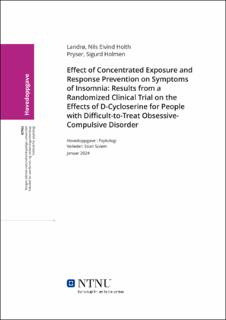Effect of Concentrated Exposure and Response Prevention on Symptoms of Insomnia: Results from a Randomized Clinical Trial on the Effects of D-Cycloserine for People with Difficult-to-Treat Obsessive-Compulsive Disorder
Master thesis
Permanent lenke
https://hdl.handle.net/11250/3123492Utgivelsesdato
2024Metadata
Vis full innførselSamlinger
- Institutt for psykologi [3086]
Sammendrag
Bakgrunn: Det er økende enighet om at insomnisymptomer blant pasienter med tvangslidelse (OCD) er vanlig. Denne randomiserte kontrollerte studien undersøkte effektene av Bergen 4-dagers behandling (B4DT) på insomni i en gruppe behandlingsresistente OCD-pasienter og om D-Cykloserin forsterker effekten av behandlingen.
Metode: Pasientene som ble inkludert (N = 163) hadde enten ikke respondert eller fått tilbakefall etter tidligere behandling basert på eksponering for OCD. De ble allokert til tre grupper som mottok enten placebo, 100 mg eller 250 mg D-Cykloserin (DCS).
Resultater: Det fremkom en liten, men robust effekt av behandlingen på insomnisymptomer (d = 0.37), opprettholdt ved 3-måneders oppfølging (d = 0.38), og noe redusert ved 12-måneders oppfølging (d = 0.23). Det var ingen signifikante forskjeller mellom gruppene som mottok DCS eller placebo. Insomni påvirket heller ikke utfallet av OCD-behandlingen.
Diskusjon: Studien indikerte at OCD-behandling påvirker insomnisymptomer positivt. Verken komorbid insomni eller DCS modererte behandlingsresultatet. Pasienter med OCD og komorbid insomni bør vurderes for spesifikk insomnibehandling. Background: There is a growing consensus concerning the large prevalence of insomnia symptoms among patients with obsessive-compulsive disorder (OCD). This randomized controlled study explored the effects of the Bergen 4-day treatment (B4DT) on sleep difficulties in a sample of difficult-to-treat OCD and whether D-Cycloserine (DCS) augmented the effect of treatment.
Methods: Patients included (N = 163) had either not responded or relapsed following OCD treatment. They were allocated to three groups receiving either a placebo, 100 mg or 250 mg of DCS.
Results: There was a small, but robust effect of the treatment on insomnia symptoms (d = 0.37), withheld at the 3-month follow-up (d = 0.38), and slightly reduced at the 12-month follow-up (d = 0.23). No significant differences between the groups receiving DCS or placebo were found. Additionally, insomnia did not affect OCD-treatment outcome.
Discussion: This study showed that OCD treatment is associated with improvement in insomnia symptoms. Comorbid insomnia and DCS did not moderate treatment outcome. Patients with OCD and comorbid insomnia should be considered for specific insomnia treatment.
